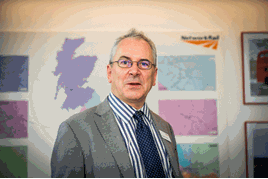“I thought your editorial [Comment, RAIL 788] was right - it’s not just about the future of NR. Control Period 4 was relatively small things, relatively cheap, and for the large part worked very well. CP5 has a much bigger and much more ambitious programme which relates to the scale of the growth in the rail industry. CP6 - there’s some really serious questions to be asked about how much you can get done and where the money’s coming from. So there is a continuum there. And actually I think they are interconnected.
“So yes, I talked to Colette during the course of her review. We have made sure that some of the lessons which are about being joined up, both within the DfT and with NR, are carried forward to the better way of dealing with enhancements and major projects for the remainder of CP5. And then I am very close to Nicola because I think the future of NR is about the future of the railway, and it’s about how you cope with growth at 5% a year - which is huge.”
Hendy pauses… then concludes: “My history’s pretty good, and I doubt there has been passenger growth on the railway of this magnitude since the middle of the Victorian era. And coping with it on a railway that’s very largely full is quite a big issue.”
Not only full, but old. Hendy again demonstrates his historical grasp.
“And old? Yes! The oldest railway in the world actually. That’s a good quote actually. I’ll swap the oldest underground railway in the world for the oldest railway in the world. The oldest structure on NR is 190 years old - part of the Stockton-Darlington Railway.”
Which is still in everyday use…
“Still in everyday use. So the reviews are all tied up. No, it’s not some sort of fruit machine coincidence that there are three reviews. And the reason for all of it is because Government seems very determined to do something about infrastructure in circumstances where other governments in similar times have not wanted to do these things.”
There’s that political imperative again. It’s a common refrain throughout our conversation.
“So what the railway has to do is respond to this level of interest and do the best that it can with the money. All very reasonable stuff actually. I’m not surprised at all that there are lots of people in transport who will say ‘it would be alright except for the politicians’. But the fact is that they give you loads of money and they want some bloody results.”
The NR chairman is also crystal clear that failure to do so will have consequences.
“And if you don’t respond to that, on a personal or an institutional basis, they’ll either change the people or the institutions so that they do. That’s perfectly reasonable.”
Presumably, that explains Mark Carne’s recent acceleration of devolution and the creation of the Route Services Directorate (internally labelled ‘DevoMax’)? A cynic might think he’s pre-empting the three reviews - but you’re suggesting that he’s actually moving in an agreed direction?
“The very first thing to say is that I’m not the chief executive,” Hendy begins, with particular emphasis.
“It’s very important that I’m not the chief executive, because I’ve done one of those jobs for nine and a half years. There’s someone already here - Mark Carne - who’s good at being chief executive, and I want to support him. I also agree, for the avoidance of doubt, that nobody’s waiting for anybody to say something in a report.”
Hendy also has what he believes is not just wider Government blessing for Carne’s policy, but implied specific support from Chancellor of the Exchequer George Osborne.
“If it’s the right thing to do then we should do it. So when Mark proposed to the board that he would accelerate devolution, we all agreed that that was the right thing to do. It fits perfectly well with a recent letter from the Chancellor that he actually wanted us to accelerate devolution. So that was actually a request from the Chancellor. It also fits with one of the three tenets that Nicola has at the core of her report, which is devolution. I think it’s the right thing to do.
“I also think it’s a good thing that it’s being done under the umbrella of a much stronger drive to produce better operational performance. My observation is that Network Rail, over successive managements, has had some wildly different policies. But by and large, I’m now seeing a really strong and continuing attempt to run the railway better, which is what Phil Hufton is working hard to do.












